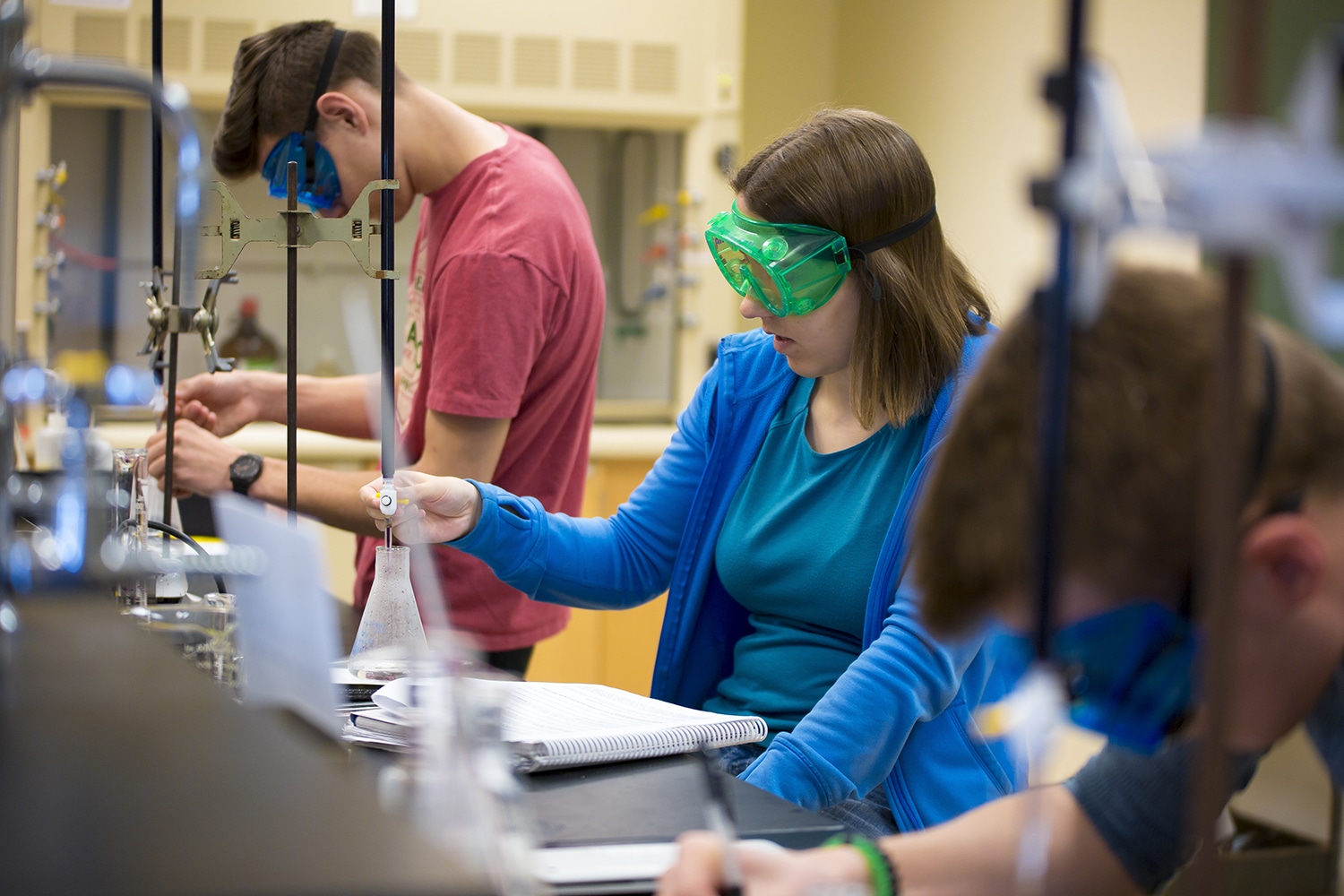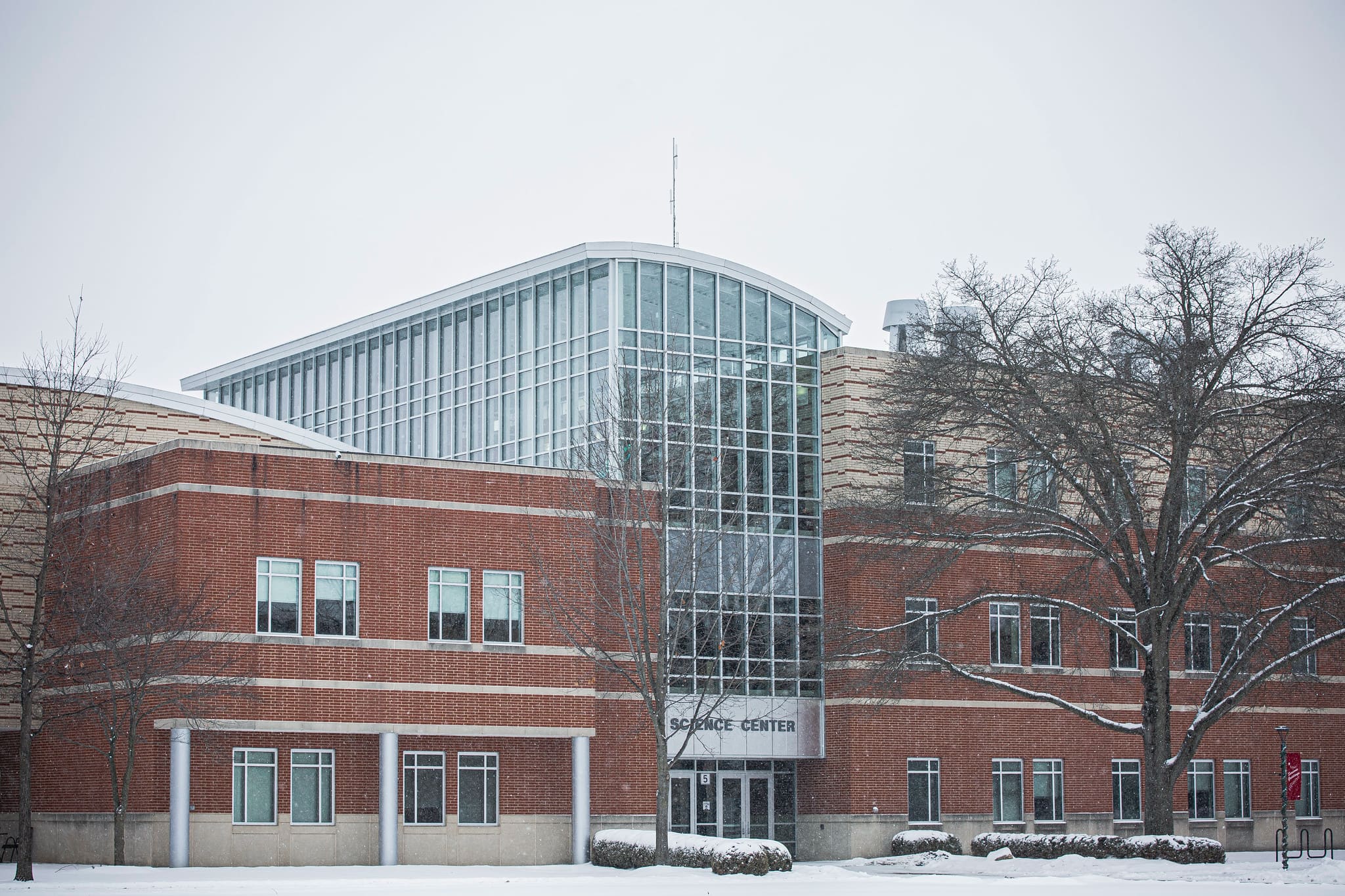Chemistry
Discover the building blocks of matter and unlock the science behind innovation with Manchester University’s chemistry program. From lab-based exploration to real-world problem-solving, this degree equips you with the skills to pursue graduate study, research, or careers in healthcare, industry, and education.

Earn Your Bachelor of Science Degree or Minor in Chemistry at Manchester University
The Chemistry program at Manchester University offers a robust foundation in scientific theory and laboratory techniques, empowering students to solve real-world problems in medicine, technology, and the environment. Whether you pursue a bachelor of science degree or a minor in chemistry, you’ll gain hands-on experience, critical thinking skills, and career-ready knowledge to thrive in graduate study, healthcare, research, or chemical industries.
Program Information:
- 59 Credit Hours
Minor
- 24 Credit Hours
Location
- North Manchester
Why Choose MU for Chemistry

Hands-On Laboratory Experience
Strong Graduate School Preparation
Personalized Faculty Support
What You Can Do With Your Bachelor of Science Degree in Chemistry
Pharmaceutical Researcher
Design, synthesize, and test new drugs in laboratory environments.
Analytical Chemist
Conduct tests to identify chemical composition in various materials.
Forensic Scientist
Analyze physical evidence to assist in criminal investigations and trials.
Chemical Industry Technician
Operate instruments and monitor production in industrial chemical facilities.

Average Starting Salary for Bachelor of Science in Chemistry Graduates
Graduates with a Bachelor of Science in Chemistry from Manchester University are well-positioned for strong entry-level salaries. Starting pay typically ranges from $47,000 to $54,000, depending on the field and employer. The U.S. Bureau of Labor Statistics reports that chemist and materials scientist roles earn a median annual salary of $80,680, while food scientists average $68,830 and forensic science technicians earn around $60,590. With experience or advanced education, chemistry majors often see mid-career salaries climb toward $85,000 or more.

How the Chemistry Program Supports Your Growth
Hands-On Lab Experience
Undergraduate Research Opportunities
Student Groups and Co-Curricular Activities
At Manchester University, chemistry and biology-chemistry students engage in rich co-curricular opportunities that support academic, professional, and personal growth.
The American Chemical Society (ACS)
ACS is a vibrant organization for students pursuing chemistry or biology-chemistry majors. Each year, ACS hosts monthly social events such as film nights, guest speakers, and science-themed field trips. The group also participates in student summer research programs, community outreach, and signature events like a fall picnic and holiday celebration. The chapter is well known for demonstrations at events like Walk Into My Future, where students inspire curiosity in visiting elementary school students through hands-on chemistry presentations.
Sigma Pi Sigma (Physics Honor Society)
While focused on physics, Sigma Pi Sigma welcomes students in related fields who demonstrate academic excellence. Manchester’s Beta chapter recognizes undergraduate and graduate students for outstanding achievement and scholarship in physics and closely aligned disciplines. Membership is a prestigious academic honor and provides leadership and networking opportunities in the broader scientific community.
January Sessions in Chemistry
Manchester’s distinctive 3-week January term offers intensive, experiential learning. Chemistry faculty lead specialized courses such as:
- Medical Practicum, where students join U.S. healthcare teams serving rural communities in Central America
- Development of Modern Scientific Thought in Great Britain, involving museum visits and historical tours
- Making of the Modern Mind, a European trip exploring philosophical shifts in science and society
- Forensic Science, a hands-on course held on campus that includes crime lab simulations like fingerprinting, DNA analysis, and arson investigation
Medical Practicum Program
More than a course, the Medical Practicum is a transformational journey that sends students to remote areas of Central America to deliver medical, dental, and veterinary care. Since its founding in 1981 by Dr. Ed Miller, this practicum has involved 468 students and served more than 50,000 patients across Nicaragua, Guatemala, Panama, and more. Students travel by bus, jeep, or canoe to reach villages without electricity or clean water, gaining an unfiltered view of global health needs. The experience often helps shape students’ career paths in medicine, pharmacy, dentistry, and public health.
Summer Research and Internships
Manchester encourages chemistry and biology-chemistry majors to explore summer research and internship opportunities. Students frequently participate in prestigious programs such as:
- NSF’s Research Experiences for Undergraduates (REU)
- National Institutes of Health internships
- U.S. Department of Education placements
- EPA and USDA research programs
American Chemical Society research listings and co-ops
Support is also available through Manchester’s Office of Career and Professional Development, which connects students to valuable fieldwork that enhances resumes and graduate school applications.
Supportive Academic Environment
Meet the Faculty
You Might Also Be Interested In These Programs

FAQs About the Bachelor of Science Degree in Chemistry
What can I do with a Bachelor of Science degree in Chemistry?
A Bachelor of Science degree in Chemistry offers a wide range of career opportunities for students interested in the sciences. Chemistry majors are prepared to enter fields such as pharmaceuticals, environmental science, forensic analysis, quality control, and chemical manufacturing.
Graduates may also explore work in chemical biology, materials science, and chemical physics, depending on their elective courses and interests. A chemistry degree prepares students for professional programs like medical school, dental school, or pharmacy, and many go on to pursue graduate study in physical chemistry, organic chemistry, or biochemistry.
The flexibility of chemistry degree programs allows students to tailor their studies toward their career goals, and the skills gained, such as laboratory experience, analytical reasoning, and data interpretation, are highly valued across multiple industries.
Manchester University’s program ensures that chemistry students meet all degree requirements, including lecture courses, hands-on lab work, and research components. Whether students are planning to become research chemists or move into applied roles in manufacturing or public health, a chemistry bachelor’s from Manchester equips them with the scientific foundation, critical thinking skills, and laboratory proficiency to thrive in diverse professional and academic environments.
Is research experience available for chemistry majors at Manchester University?
Yes, Manchester University strongly emphasizes undergraduate research in its Bachelor of Science degree in Chemistry. Chemistry majors have access to hands-on research opportunities that allow them to explore topics in general chemistry, physical chemistry, organic chemistry, and chemical physics.
These experiences not only support classroom learning but also prepare students for graduate study or professional training. Chemistry students work directly with faculty on meaningful research projects, gaining valuable insight into experimental design, data analysis, and scientific presentation. Many students present their findings at conferences or co-author publications—unique advantages for students pursuing graduate school or careers in science-related industries.
The chemistry program includes elective courses that allow students to specialize in their research interests in areas such as biochemistry, materials science, or environmental science. Engaging in undergraduate research strengthens a student’s resume, builds technical and problem-solving skills, and demonstrates the ability to conduct independent work—an essential trait for research chemists and professionals in scientific roles.
Through senior research and guided lab work, chemistry prepares students to transition seamlessly into both advanced education and industry settings, while also meeting major requirements and contributing to their overall academic growth.
Are there internship opportunities in the Chemistry program?
These opportunities help chemistry students build essential laboratory experience in settings that apply general chemistry, organic chemistry, analytical chemistry, and physical chemistry in real time. Internships allow students interested in chemical biology or materials science to explore career paths, build professional networks, and enhance their resumes.
For students pursuing graduate school or professional programs, internships offer meaningful insight into what specific roles entail—whether it’s working in chemical separations, developing new compounds, or performing chemical analysis using advanced instruments.
Additionally, these roles often align with courses listed in the degree requirements, helping students reinforce concepts learned in the classroom. Manchester’s faculty and career services team actively support students in identifying internship sites that align with their goals, providing guidance throughout the application and placement process.
By engaging in internships, chemistry majors not only meet minimum grade and credit expectations but also gain valuable experience that prepares them for full-time employment and lifelong learning in the physical sciences.
Does the program prepare me for graduate or professional school?
Students also engage in laboratory experiences, senior research projects, and optional elective courses in specialized areas like biochemistry, chemical biology, and materials science. This curriculum ensures that chemistry prepares students for success in graduate study by building critical thinking, technical proficiency, and scientific communication skills.
The university’s supportive environment—featuring small class sizes, accessible faculty, and individualized advising—helps students planning to continue their education select appropriate courses and meet all major requirements, including maintaining a minimum cumulative major GPA.
Additionally, research experience and internships further enhance student readiness for competitive admissions processes. Whether pursuing an ACS certified degree or aligning their program with the American Chemical Society Committee guidelines, students benefit from a chemistry bachelor that fosters intellectual growth and professional competence.
Graduates of Manchester’s chemistry program have gone on to pursue advanced degrees in chemistry, biology, medicine, public health, and more, showcasing the strength of the school’s science degree offerings.
What facilities and equipment are available for chemistry students?
Chemistry students at Manchester University benefit from access to well-equipped, modern laboratory spaces designed to support high-quality instruction and research. Facilities include dedicated labs for general chemistry, organic chemistry, analytical chemistry, and physical chemistry, each stocked with professional-grade instruments and tools.
Equipment available includes gas and liquid chromatographs, infrared (IR) and ultraviolet-visible (UV-Vis) spectrometers, nuclear magnetic resonance (NMR) instrument, and specialized systems for instrumental analysis and chemical separations.
These resources provide chemistry majors with hands-on experience that reflects real-world laboratory environments, preparing them for both employment and graduate study. The department also supports students interested in medicinal chemsitry, biochemistry, instrumental analysis, and chemical education by offering tailored lab spaces and additional coursework.
Faculty ensure that laboratory experiences align with lecture courses and degree requirements while fostering safe, independent exploration. The university continually updates its lab technology to reflect current industry standards, helping students stay competitive in chemistry programs nationwide.
These resources are integral to student success, not only meeting academic benchmarks like the minimum grade requirements but also building confidence and competence in technical settings. Overall, Manchester’s facilities help chemistry prepare students for careers in physical sciences, medicine, forensics, and beyond.
Can I double major or minor alongside Chemistry?
For example, students interested in biochemistry or medical school often combine chemistry with biology to strengthen their preparation for professional training. Those intrigued by environmental chemistry or chemical physics may pursue environmental studies as a secondary field.
The flexibility of Manchester’s degree programs and elective courses allows chemistry students to meet degree requirements efficiently, often completing a double major or minor without extending their time to graduation.
Faculty advisors work closely with students to map out course sequences, ensure alignment with major requirements. Additionally, pairing chemistry with another discipline can broaden career options in research, teaching, technical writing, or regulatory science.
Whether students are planning for graduate study, professional school, or entry into the workforce, combining chemistry with another academic area strengthens their credentials and expands their scientific and analytical toolkit.
Chemistry Learning Outcomes
Program Learning Outcomes
1. Understand chemical principles.
Student Learning Outcomes:
- Demonstrate mastery of fundamental principles in analytical, inorganic, organic, and physical chemistry.
- Use fundamental chemical principles to predict the properties of a chemical sample.
2. Perform standard chemical analyses.
Student Learning Outcomes:
- Use standard laboratory equipment, instrumentation, and techniques to carry out chemical separations and analysis.
- Articulate proper procedures and regulations for safely handling and using chemicals and equipment.
- Develop and carry out a research plan.
3. Present scientific data to a target audience.
Student Learning Outcomes:
- Use qualitative and quantitative methods to interpret scientific data.
- Locate, summarize, and cite appropriate sources from the chemical literature.
- Create effective reports in discipline-specific format and styles.
Non-Discrimination in the Admission Process
Manchester University is committed to non-discrimination in campus life. The University does not discriminate on the basis of national origin, ancestry, race, color, age, sex, gender identity or expression, sexual orientation, familial status, religion, disability or veteran status in admissions or any area of campus life, including its educational programs, scholarships and loan awards, residence life programs, athletic programs, extracurricular programs, promotion and tenure policies and practice, and alumni affairs.
Manchester University is committed to carry out the provisions of Section 504 of the Rehabilitation Act of 1973 and the Americans With Disabilities Act, which provide for accessibility of University programs to the physically disabled.










